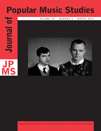
Journal of Popular Music Studies
Scope & Guideline
Engaging in the Dialogue of Sound and Society
Introduction
Aims and Scopes
- Cultural Studies Approaches:
The journal emphasizes the significance of cultural contexts in understanding popular music, exploring how music interacts with identity, community, and cultural practices. - Political and Social Analysis:
It investigates the interplay between music and societal issues, such as race, gender, and class, thus highlighting the role of music in social movements and political discourse. - Transnational Perspectives:
The journal explores the global dimensions of popular music, examining cross-cultural influences and the dynamics of music in a transnational context. - Interdisciplinary Methodologies:
Research published in the journal employs diverse methodologies, including ethnography, historical analysis, and critical theory, to provide comprehensive insights into popular music phenomena. - Technological Impact:
The journal addresses the implications of technology on music production, distribution, and consumption, especially in the context of digital media and the evolving music industry.
Trending and Emerging
- Queer and Gender Studies:
There is a growing emphasis on queer narratives and gender studies within popular music, exploring the intersections of identity, representation, and culture, which reflects broader societal discussions about gender and sexuality. - Digital Culture and Music Consumption:
Research focusing on the impact of digital platforms on music consumption, including streaming services and social media, has seen an increase, highlighting the changing landscape of how music is created and experienced. - Social Justice and Activism:
Themes related to social justice, particularly in the context of hip-hop and other genres, are trending, indicating a heightened awareness of music's role in activism and societal change. - Globalization and Cultural Hybridity:
Emerging studies are increasingly examining the effects of globalization on music, particularly how cultural hybridization shapes contemporary musical practices and identities. - Podcasting and New Media:
The rise of podcasts as a medium for music discussion and critique is being recognized, with research exploring how this format influences music journalism and audience engagement.
Declining or Waning
- Traditional Genre Studies:
There has been a noticeable decline in papers strictly focused on traditional genre categorizations, such as rock or pop music, as the journal shifts towards more nuanced, interdisciplinary explorations of music. - Historical Narratives without Contemporary Relevance:
Research that solely emphasizes historical accounts of popular music without connecting these narratives to contemporary cultural or social issues has become less frequent, reflecting a trend towards relevance in current discourse. - Static Analyses of Music Production:
Papers that analyze music production techniques in isolation, without considering broader cultural or technological contexts, seem to be diminishing, indicating a shift towards more integrated approaches. - Regional Studies with Limited Scope:
Regional studies that do not engage with transnational or global connections are appearing less often, suggesting a preference for research that highlights interconnectedness in popular music.
Similar Journals
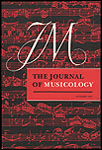
JOURNAL OF MUSICOLOGY
Unveiling the Rich Tapestry of Musical HeritageJOURNAL OF MUSICOLOGY, published by UNIV CALIFORNIA PRESS, stands as a premier academic forum for the exploration and dissemination of research in the field of musicology. With an ISSN of 0277-9269, this journal provides a vital platform for scholars, practitioners, and educators to engage with contemporary and historical music studies. The journal, which has been publishing significant works since 1982 and continues through to 2024, boasts a commendable Q2 ranking in Music and holds a notable position within the 68th percentile of Scopus rankings for Arts and Humanities, specifically in Music. Although it does not offer open access, the journal remains a crucial resource for those dedicated to advancing the understanding of musical heritage, theory, and practice. The JOURNAL OF MUSICOLOGY aims to foster interdisciplinary dialogue and promote innovative methodologies within the field, thereby making it an essential read for all engaged in the scholarly pursuit of music.
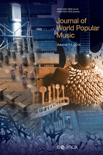
Journal of World Popular Music
Illuminating the Sociocultural Impact of Global MelodiesJournal of World Popular Music, published by EQUINOX PUBLISHING LTD, serves as a pivotal platform for scholars and practitioners within the evolving field of popular music studies. With an ISSN of 2052-4900, this esteemed journal has notably positioned itself within the Q2 category of Music as of 2023 and ranks at #90 out of 180 in the Arts and Humanities sector according to Scopus metrics. Spanning research from 2014 to 2023, the journal invites contributions that span diverse musical genres, cultural studies, and global perspectives, ultimately enriching the discourse surrounding the sociocultural impact of popular music. While not open access, the journal offers a robust platform for interdisciplinary research, making it indispensable for researchers, educators, and students keen on exploring the dynamics of popular music and its role in contemporary societies.
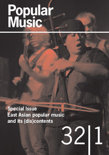
Popular Music
Charting the Evolution of Music and IdentityPopular Music, published by Cambridge University Press, is a leading academic journal that has been at the forefront of contemporary music studies since its inception in 1981. With its comprehensive scope encompassing a rich diversity of topics within the fields of Cultural Studies and Music, this journal holds a respectable Q2 ranking in both categories as of 2023, underscoring its significant impact on the scholarly discourse surrounding popular music. Researchers, professionals, and students alike will find invaluable insights within its pages as it explores the socio-cultural dynamics of music from various global perspectives. While it is not an open-access journal, the publication aims to foster critical dialogue and interdisciplinary scholarship. Based in the United Kingdom, Popular Music serves as a vital resource for those interested in the intersections of music, culture, and society, sustaining a vibrant academic community through rigorous peer-reviewed articles and reviews. Engage with the latest research and deepen your understanding of popular music's ever-evolving landscape.
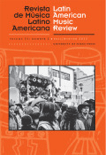
LATIN AMERICAN MUSIC REVIEW-REVISTA DE MUSICA LATINOAMERICANA
Unveiling the Cultural Tapestry of Latin American SoundsLATIN AMERICAN MUSIC REVIEW-REVISTA DE MUSICA LATINOAMERICANA stands as a prominent scholarly journal dedicated to the profound and diverse traditions of Latin American music. Published by University of Texas Press, this journal offers a platform for critical analysis, innovative research, and the dissemination of knowledge concerning the rich cultural heritage of Latin America. Although it currently does not provide open access options, the journal has made significant contributions to the field since its establishment, engaging a wide array of interdisciplinary perspectives. With coverage spanning from 2002 to 2009, the journal has been central to fostering scholarly dialogue and expanding the academic understanding of Latin American musicology, serving as an essential resource for researchers, professionals, and students alike. The journal is vital for those exploring the intersections of music, culture, and identity within the vibrant landscapes of Latin America.
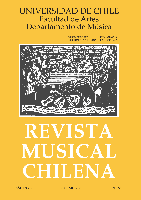
Revista Musical Chilena
Elevating Voices in Music Research and Cultural TheoryRevista Musical Chilena, an esteemed publication from the Faculty of Arts at Universidad de Chile, has been a pivotal platform in the field of music and cultural studies since its inception in 1945. With a commitment to open access, this journal promotes the dissemination of innovative research and critical discourse that bridges the gap between cultural theory and musical practice. Holding a notable Q2 ranking in both the Cultural Studies and Music categories as of 2023, it serves as a vital resource for scholars and professionals alike. The journal's inclusion in the Scopus database, with rankings that reflect its influence in the arts and humanities, underscores its significance in shaping the contemporary landscape of music studies. Given its convergence of research output from 2007 to 2024, Revista Musical Chilena continues to engage its audience with diverse scholarship that reflects Chilean musical heritage and global cultural dynamics.

LIED UND POPULARE KULTUR-SONG AND POPULAR CULTURE
Cultivating Insights into Cultural ExpressionsLIED UND POPULARE KULTUR-SONG AND POPULAR CULTURE, published by WAXMANN VERLAG GMBH, is a unique interdisciplinary journal that delves into the rich interconnections between song and popular culture, facilitating discourse among researchers, professionals, and students interested in cultural studies and musicology. With ISSN 1619-0548, this prestigious journal serves as a crucial platform for scholarly analysis, critical reviews, and innovative research exploring various facets of popular music and cultural expressions in Germany and beyond. Although classified in the 2023 Scopus category quartiles as Q4 in both Cultural Studies and Music, the journal maintains an essential role in fostering engagement and reflection on evolving cultural practices. Although it is not available as Open Access, articles from the journal have previously contributed valuable insights and shaped the conversation on popular culture from its inception in 2002 to its recent issues in 2023. Researchers will find this journal particularly relevant for its focus on underrepresented voices and themes within the cultural landscape.
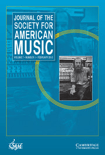
Journal of the Society for American Music
Charting New Territories in American Music ScholarshipThe Journal of the Society for American Music is a leading academic journal dedicated to the study of American music and its diverse cultural contexts. Published by Cambridge University Press, this journal serves as a vital platform for researchers and professionals in the fields of musicology, ethnomusicology, and American studies, contributing significantly to scholarly discourse and advancing knowledge in these areas. With an impressive impact factor reflecting its academic rigor, it is placed in Q2 of the music category as of 2023 and ranks #55 out of 180 in the Arts and Humanities segment, placing it in the 69th percentile among its peers. Since its inception, the journal has published a wealth of articles, reviews, and critical studies that explore the rich tapestry of American musical traditions from historical and contemporary perspectives. It operates under a subscription model, ensuring a wide distribution and accessibility to its important findings. Researchers, students, and professionals alike will find the journal an essential resource for advancing their understanding of the dynamic landscape of American music.

CULTURAL CRITIQUE
Illuminating Cultural Phenomena with Academic RigorCULTURAL CRITIQUE is a premier academic journal published by University of Minnesota Press, dedicated to the interdisciplinary exploration of cultural phenomena through the lenses of anthropology, cultural studies, literature and literary theory, philosophy, and sociology. With its ISSN 0882-4371 and E-ISSN 1460-2458, the journal serves as a vital forum for scholars to engage, debate, and disseminate innovative ideas and methodologies that redefine cultural narratives and critiques. Spanning a publication timeline from 2002 to 2024, CULTURAL CRITIQUE holds significance in various academic categories, achieving Q4 rankings in anthropology and sociology and as high as Q2 in literature and literary theory. Its Scopus rankings further reinforce its value, placing it in the 82nd percentile among literature-related journals. Although it currently does not offer open access, this journal is key for researchers, professionals, and students aiming to deepen their understanding of culturally driven debates in the contemporary landscape.
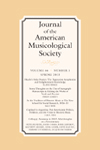
JOURNAL OF THE AMERICAN MUSICOLOGICAL SOCIETY
Fostering scholarly dialogue in musicology.JOURNAL OF THE AMERICAN MUSICOLOGICAL SOCIETY, published by University of California Press, is a prestigious peer-reviewed journal dedicated to advancing the field of musicology. With an ISSN of 0003-0139 and E-ISSN 1547-3848, this journal has been a cornerstone of scholarly communication since its inception in 1970 and continues to be relevant through 2024. Its esteemed standing is reflected in its Q2 ranking in the Music category and a respectable 71/180 ranking in the Arts and Humanities discipline, placing it in the 60th percentile among its peers. The journal provides an essential platform for researchers, professionals, and students to explore diverse topics in musicology, ranging from historical studies to contemporary analyses. While it does not currently offer Open Access options, its rigorous editorial standards ensure the publication of high-quality research that contributes significantly to the academic dialogue in music studies. With its address based in the United States at 155 Grand Ave, Suite 400, Oakland, CA 94612-3758, the journal remains a vital resource for those seeking to deepen their understanding of the complexities of music and its societal impacts.

INTERNATIONAL REVIEW OF THE AESTHETICS AND SOCIOLOGY OF MUSIC
Connecting Cultures Through the Lens of MusicThe INTERNATIONAL REVIEW OF THE AESTHETICS AND SOCIOLOGY OF MUSIC, published by the Croatian Musicological Society, is a pivotal scholarly journal dedicated to the intricate intersection of music, aesthetics, and sociology. With a special focus on exploring the cultural and social dimensions of music, this journal serves as a platform for researchers, professionals, and students alike to disseminate innovative ideas and transformative research. Although it operates under a traditional access model, the journal's impact within the field of music studies is underscored by its commendable Scopus ranking in the Q3 category and its established history from 2009 to 2016, with a renewed focus from 2018 to 2023. With an ISSN of 0351-5796, it continues to shape academic discourse with its insightful contributions and is essential for those aiming to engage deeply with the evolving dynamics of music in society.